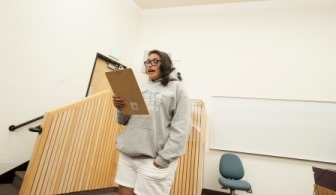Idaho State U. Stuttering Clinic, first of its kind, changes lives
August 26, 2014
Idaho State University’s first holistic stuttering clinic, which combined speech language and counseling therapy, garnered powerful testimony from its participants.
“They poured their hearts, tears and souls into this clinic to make it successful,” said Rick Huang, 33, a participant from Austin, Texas, who grew up in Taiwan. “I think this clinic can serve as a model for other universities around the United States and the world, combining experts from speech pathology with experts from counseling. There are a lot of emotional issues we need to work on.”
The ISU Northwest Center for Fluency Disorders Intraprofessional Intensive Stuttering Clinic (NWCFD-IISC) attracted nine participants from throughout Idaho and the United States, and one international participant from Kuwait. The two-week clinic, which ran from July 26 to Aug. 9, is unique in that it featured professionals from the ISU Department of Communication Sciences and Disorders and Department of Counseling at ISU.
“It has really changed the way I think about stuttering,” said Nick Olsen, 16, from Phoenix, Arizona. “I know that stuttering does not affect who you are and all kinds of different people stutter.”
The clinic’s one international student, Sarah Albannay, an ISU student from Kuwait City, Kuwait, was one of several participants who said that in addition to the speech therapy, the emotional counseling was important.
“It’s been awesome,” said Albannay, who passed up an opportunity to go home and visit her family so she could attend the clinic. “It has been good, but emotional, because you talk to a speech therapist and a counselor, and you have to tell them about your stuff or whatever, like how it has been for you to stutter. I’ve not talked to anyone about my stuttering before. It has been very emotional, but very valuable.”
Albannay and several other participants said the clinic was a rare opportunity for them to meet and get to know other people who stutter.
“This clinic exceeded my expectations,” said Keven Chesnov, 32, from Long Island, New York. “It was definitely an eye-opening experience. I had never met someone else who stutters, so knowing that I am not alone definitely made it a little easier on myself. “
“We cried a lot,” said Huang. “Many of us had not met another person who stutters.”
The clinic was organized by to Dan Hudock, an ISU assistant professor of communications science and disorders who specializes in fluency disorders and stutters himself.
“Five of the nine clients have said this is the best thing they’ve ever done in their entire life and it has been dramatically life-changing,” Hudock said. “To hear that from our clients, is such a rewarding experience. I really believe people will go home with a new view on life. It has opened up a whole world of possibilities.”
He said the participation by counseling graduate students was invaluable.
“Stuttering is a very isolating disorder,” Hudock said. “One of our innate needs as a human is to communicate, and when you can’t communicate you can become socially withdrawn. Spending two weeks talking openly about stuttering is something many of the clients had never done.”
Several clients said that it was beneficial having someone who stutters lead the clinic.
“Dr. Dan is awesome,” Albanny said. “He inspires you to do anything you want even if you stutter.”
The clinic was also valuable to the ISU graduate students who participated.
“The biggest value is just learning about stuttering and the emotional impact it has on individuals,’ It really is impactful on people,” said Kelsey Pierce, a master’s student in ISU’s counseling program.
Her counterpart in ISU’s speech pathology program, Diana Williams, said she appreciated the input from the counseling students. “Having the counseling piece to address all the underlying emotional issues was really nice to have, to treat the whole person. When you bring in the counseling piece you are treating everything involved.”
The clinic, for adults and teens who stutter, will be held annually. The cost was $1,000, which included food, lodging and materials for the two-week clinic. Most participants this year received from 30 to 100 percent scholarships due to the Brenda Bertsch Malepeai Memorial Fund through the ISU Foundation and because Dan Hudock, Jody O’Donnell, and Sarah Knudson, the speech pathology supervisors, donated their salaries to be used for client scholarships.
Additionally, counseling professionals Linwood G. Vereen and Chad Yates volunteered their time to assist with the clinic.
“In addition to the Brenda Bertsch Malepeai Memorial Fund we are in the process of developing a Northwest Center for Fluency Disorders Fund through the ISU Foundation for continued support for the clients and clinic.”
Both funds, run through ISU Foundation, are tax deductible and offer a 50 percent Idaho Tax rebate up to $1,000 per individual and $2,000 per family.
“We’re hoping to make our clinic self sustaining to help those who stutter from around Idaho and the world,” Hudock said. “From the regional and national press we’ve had about the clinic, we’ve already received several calls from potential clients around the US to attend next year’s clinic.”
For more information on this clinic, contact Hudock at hudock@isu.edu or visit http://www.northwestfluency.org/.
Categories:
